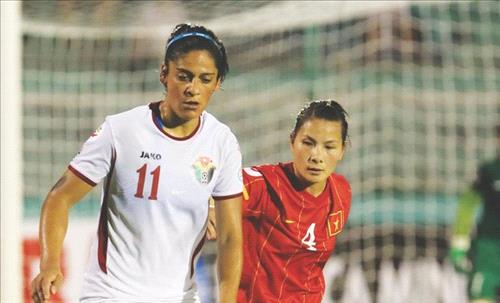Ammon News - AMMONNEWS - In 10 weeks’ time, the World Cup kicks off in Russia and Middle East audiences, as much as any around the world if not more, will tune in to see how Egypt, Saudi Arabia, Morocco and Tunisia, not to mention Germany, Brazil, Spain, France and England, will get on.
Before that, however, there is one competition far closer to home that in many ways will perhaps have a longer-lasting impact on Middle East football.
In five days, the 2018 AFC Women’s Asian Cup kicks off in Amman, bringing the continent’s best 16 teams to an Arab country for the first time.
Only one Arab team, hosts Jordan, will compete. But the importance of their participation will send a positive message to the region.
Jordan are the highest-ranked Arab team in the world, at 51 in FIFA’s rankings. The next best is Morocco at 73, while Bahrain are 77th and Egypt 78th. The UAE (the next highest Gulf team) are at 81 in the world.
Sadly, no other Arab nation from the Asian Football Federation (AFC) are close.
Being the only Arab team at the tournament may be a heavy burden, but it is one that Jordan’s players will be happy to shoulder in front of their own fans.
The hosts have been drawn in Group A with China, Thailand and the Philippines. Group B has Japan, Australia, South Korea and Vietnam.
Coach Michael Dickey’s team will not take their opponents lightly, but they will be pleased to avoid the three teams that beat them in the group stages of the 2014 AFC Women’s Asian Cup: Japan, Australia and hosts Vietnam.
The team is better prepared this time, with star players such as captain Stephanie Al-Naber and goal machine Maysa Jbarah set to play important roles.
A lot will depend on whether Jordan can reproduce their form of the past couple of years against West Asia’s teams when it really matters against the continent’s stronger nations.
But the tournament is about more than goals and results.
At the turn of the century, women’s football across the Arab world barely existed in any meaningful sense.
That is not surprising, for a host of sociopolitical, cultural, sporting and logistical reasons.
We live in a different landscape now. Jordan continues to blaze a trail for Arab women’s teams. In 2016, the country hosted the U17 women’s World Cup, which was won by North Korea. Jordan were knocked out after losing to Spain, Mexico and New Zealand.
Yet the 16-team tournament was Jordan’s first FIFA-sanctioned competition and empowerment has come from high places.
“To have young girls playing sports, and playing football specifically, can do so much to change attitudes and perceptions as to how society perceives women,” said Jordan’s Queen Rania.
“If a Jordanian woman wants to play football, I say ‘go for it.’ Because you are a role model for society, for changing traditional roles and challenging negative perceptions regarding women. And football is the healthiest and most inspiring way to do this.”
Clearly, it is too early to compare women’s football in the Arab world to the men’s game in the Middle East or to other women’s teams around the world. For now, it is enough to see the improvement in the region itself over the past decade or so. Across the rest of the Arab world, women’s football is starting to be taken seriously.
Apart from pioneers such as Jordan, Tunisia and Morocco, Bahrain was the first to set up a women’s team in the Gulf, in 2003.
In the past five years, the UAE Football Association has arguably done more than any other national body to promote the game among females, from grassroots initiatives to setting up a league that included local Emirati clubs as well as expatriate sides.
Although the UAE failed to qualify for next week’s competition in Jordan, modest but steady progress is being achieved.
“We have played in a lot of competitions, especially in the AFC Asian Cup qualification in Tajikistan,” UAE women’s coach Houriya Al-Taheri said.
“That was a very big jump in terms of improvement in the performances of the players. It helped their understanding of the game; now they know a different level of football, not just the development level. They saw how Jordan, who were in our group, are one of the best Arab and West Asia teams.”
As mentioned by Al-Taheri, Jordan took part in the qualifications despite being guaranteed a place at the tournament as hosts, the idea being to gain as much experience as possible.
It is hoped that such attitude and dedication will translate to performances on the pitch, starting this week.
But whatever the results, and before a ball has been kicked, Jordan has already struck an important blow for women’s football across the Arab world.
*Arab News








 comment replay
comment replay 